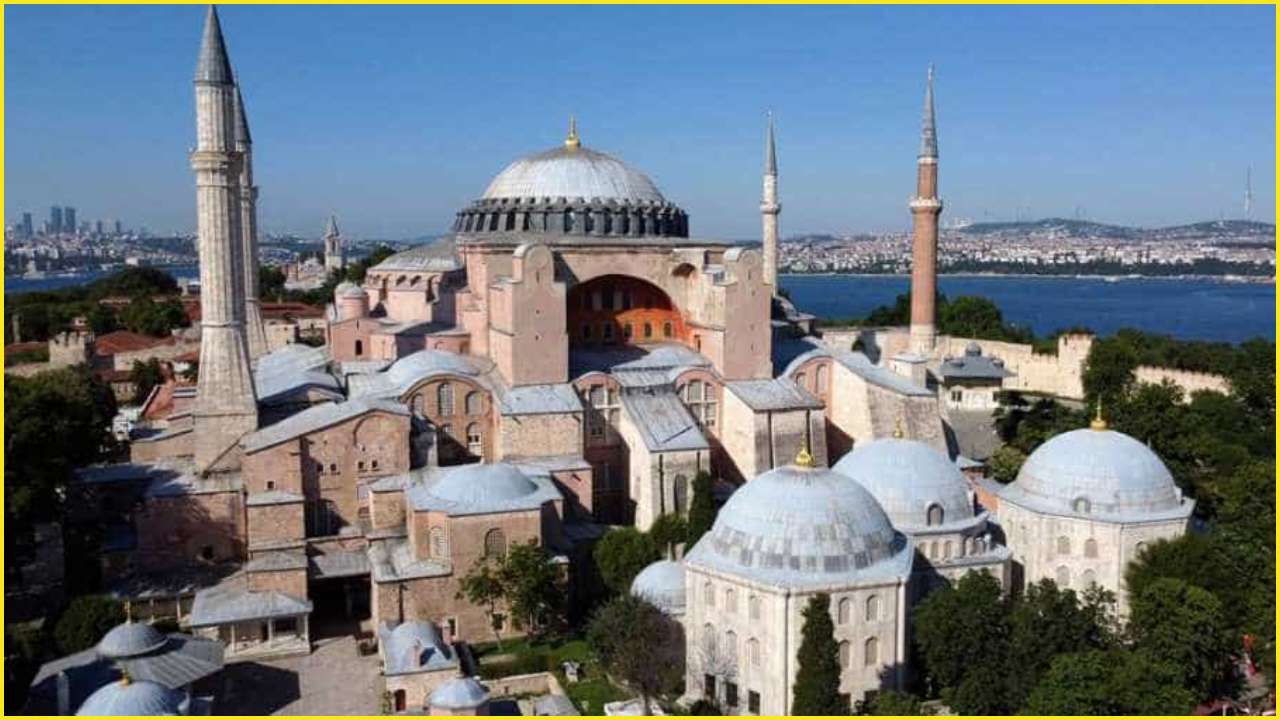Recently, the government of Turkey has decided to convert Istanbul’s iconic Hagia Sophia Museum into a mosque.

Picture Source : DNA
What is Hagia Sophia?
- Hagia Sophia was built in the sixth century by the Byzantine Emperor Justinian, and was a Christian place of worship for nearly 1,000 years before what was then known as Constantinople was conquered by the Ottoman Turks after a bloody siege in 1453.
- It is a historic house of worship located in Istanbul.
- It is revered by Christians and Muslims alike.
- In 1934, in the early days of the modern secular Turkish state under Mustafa Kemal Ataturk, it became a museum.
- There have been calls for long from Islamist groups and nationalists in the country to convert the Hagia Sophia back into a mosque.
- It is a UNESO world heritage site.
- The 1,500-year-old structure has been listed as a UNESCO’S World Heritage site. A World Heritage Site is a place that is listed by UNESCO as of special cultural or physical significance.
- In 2019, Turkey’s President Recep Tayyip Erdoğan had said it he would turn the structure back into a mosque again.
What is the controversy about?
- When Erdogan entered politics three decades ago in Turkey, he objected to the calls to convert Hagia Sophia into a mosque.
- But his rhetoric changed in 2019 during municipal elections in Istanbul that he ended up losing.
- Erdogan’s plans for the conversion of the Hagia Sophia are closely connected with his attempts to score political points.
Why is Greece objecting to this conversion?
- The controversy about the Hagia Sophia comes at a time when there are diplomatic tensions between Turkey and Greece over other issues.
- In May 2020, Greece objected to the reading of passages from the Quran inside the Hagia Sophia.
- Greece’s Foreign Ministry had issued a statement saying this move was a violation of UNESCO’s ‘Convention Concerning the Protection of the World Cultural and Natural Heritage’.
- Greece had said the Hagia Sophia had been designated a museum of world cultural heritage.
What is Turkey’s response?
- Turning the site into a mosque has hit at the heart of Turkey’s religious-secular divide. Nationalist and conservative groups in Turkey have long yearned to hold prayers at Hagia Sophia, which they regard as part of the Muslim Ottoman legacy.
- Others believe it should remain a museum, as a symbol of Christian and Muslim solidarity.
- Discussions on social media have exposed the sensitivity of the debate, with many on both sides criticising the move as a political tactic by Mr Erdogan to push his right-wing ideologies.
- Turkey responded by saying that Greece’s objections to the reading of passages from the Quran were indicative of its intolerant psychology.
- Some within Turkey’s political circles view the issue of Hagia Sophia as a domestic matter.
- So, they do not seem to welcome the interference of international players.
What is next?
- Erdogan does not need the courts to decide on the fate of the Hagia.
- The courts believe that legal rulings will add legitimacy to his proposals.
- There has been opposition to these plans within Turkey, as the religious minorities do not wish to be involved in such a polarising subject.
- Greece had appealed to UNESCO, objecting to Turkey’s moves on grounds that the conversion would violate international conventions.
- The UNESCO too has denounced Turkey’s plans.
From Mains Perspective
As the world reels under the pandemic and is making all possible attempts to recover from the setback, the Government of Turkey should have focussed all its energy on strengthening its economy and building the nation at large. Instead, Turkey chose to open the door to a religious controversy. This action of the Turkish authorities is against the ethos of Islam, which calls out for establishing peace and harmonious relations between people of different faiths. Allowing such freedom is the bedrock of human civilisation and it is incumbent upon each one of us to preserve it today and in future! This is the only choice mankind has.
Now Related MCQ
Hagia Sophia, the monument that was seen in news recently, is located in which country?
a. Italy
b. Turkey
c. Australia
d. France